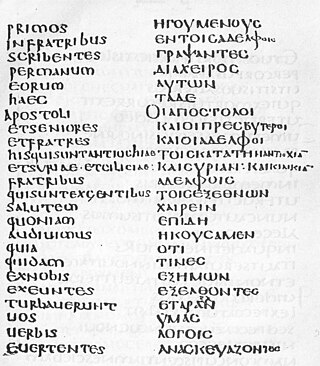
Acts 15 is the fifteenth chapter of the Acts of the Apostles in the New Testament of the Christian Bible. It records Paul and Barnabas traveling to Jerusalem to attend the Council of Jerusalem and the beginning of Paul's second missionary journey. The book containing this chapter is anonymous but early Christian tradition uniformly affirmed that Luke composed this book as well as the Gospel of Luke.
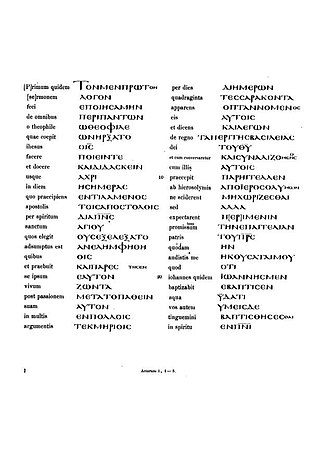
Acts 1 is the first chapter of the Acts of the Apostles in the New Testament of the Christian Bible. The book containing this chapter is anonymous but early Christian tradition affirmed that Luke composed this book as well as the Gospel of Luke. This chapter functions as a transition from the "former account" with a narrative prelude, repeated record of the ascension of Jesus Christ with more detail and the meeting of Jesus' followers, until before Pentecost.

Acts 4 is the fourth chapter of the Acts of the Apostles in the New Testament of the Christian Bible. The book containing this chapter is anonymous but early Christian tradition affirmed that Luke composed this book as well as the Gospel of Luke. This chapter records the aftermath of a healing by Simon Peter and his preaching in Solomon's Portico, that Sanhedrin arrested the apostles, but had to let them go.
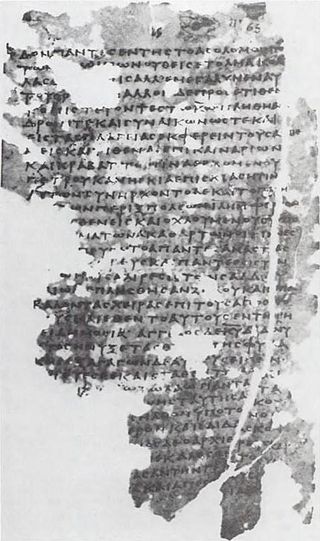
Acts 5 is the fifth chapter of the Acts of the Apostles in the New Testament of the Christian Bible. It records the growth of the early church and the obstacles it encountered.

Acts 11 is the eleventh chapter of the Acts of the Apostles in the New Testament of the Christian Bible. It records that Saint Peter defends his visit to Cornelius in Caesarea and retells his vision prior to the meeting as well as the pouring of Holy Spirit during the meeting. The book containing this chapter is anonymous but early Christian tradition uniformly affirmed that Luke composed this book as well as the Gospel of Luke.
Acts 20 is the twentieth chapter of the Acts of the Apostles in the Christian New Testament of the Bible. It records the third missionary journey of Paul the Apostle. The book containing this chapter is anonymous, but early Christian tradition uniformly affirmed that Luke the Evangelist composed this book as well as the Gospel of Luke.

Romans 12 is the twelfth chapter of the Epistle to the Romans in the New Testament of the Christian Bible. It is authored by Paul the Apostle, while he was in Corinth in the mid-50s AD, with the help of an amanuensis (secretary), Tertius, who adds his own greeting in Romans 16:22.
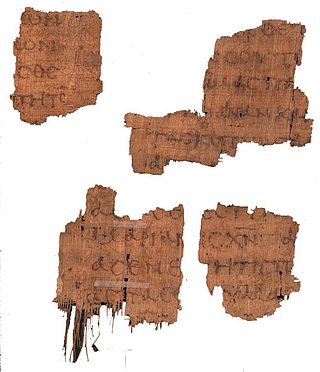
Romans 16 is the sixteenth chapter of the Epistle to the Romans in the New Testament of the Christian Bible. It is authored by Paul the Apostle, while Paul was in Corinth in the mid-50s AD, with the help of a secretary (amanuensis), Tertius, who adds his own greeting in Romans 16:22. Chapter 16 contains Paul's personal recommendation, personal greetings, final admonition, grace, greetings from companions, identification of writer/amanuensis and blessing. The chapter is divided into 27 verses.

2 Corinthians 3 is the third chapter of the Second Epistle to the Corinthians in the New Testament of the Christian Bible. It is authored by Paul the Apostle and Timothy in Macedonia in 55–56 BC. Biblical commentator Heinrich Meyer emphasises that the use of the plural 'we' in 2 Corinthians 3:2 and 2 Corinthians 3:6 includes Timothy in the writing of the letter.

Galatians 1 is the first chapter of the Epistle to the Galatians in the New Testament of the Christian Bible. It is authored by Paul the Apostle for the churches in Galatia, written between 49 and 58 AD. This chapter contains Paul's significant exposition concerning the significance of God's revelation of Jesus Christ.

1 Thessalonians 5 is the fifth chapter of the First Epistle to the Thessalonians in the New Testament of the Christian Bible. It is authored by Paul the Apostle, likely written in Corinth in about 50-51 CE for the church in Thessalonica. This chapter contains a message about Christ's second coming, and various final exhortations and greetings.

1 Timothy 1 is the first chapter of the First Epistle to Timothy in the New Testament of the Christian Bible. The author has been traditionally identified as Paul the Apostle since as early as AD 180, although most modern scholars consider the letter pseudepigraphical, perhaps written as late as the first half of the second century AD.

Philippians 1 is the first chapter of the Epistle to the Philippians in the New Testament of the Christian Bible. It is authored by Paul the Apostle about mid-50s to early 60s AD and addressed to the Christians in Philippi, written either in Rome or Ephesus. This chapter contains the greeting, thanksgiving, prayer and exhortation as an introduction (overture) to the major narratives in the next chapters.
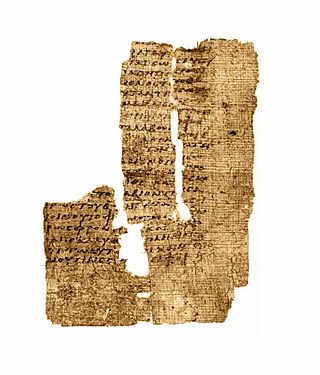
Philippians 4 is the fourth and final chapter of the Epistle to the Philippians in the New Testament of the Christian Bible. It is authored by Paul the Apostle about mid-50s to early 60s AD and addressed to the Christians in Philippi. This chapter contains Paul's final exhortation, thanks for support and conclusion of the epistle.

2 Timothy 1 is the first chapter of the Second Epistle to Timothy in the New Testament of the Christian Bible. The letter is traditionally attributed to Paul the Apostle, the last one written in Rome before his death, addressed to Timothy. Some scholars argue that it is the work of an anonymous follower, after Paul's death in the first century AD. This chapter contains an opening greeting, a personal story of Paul and Timothy, and a description of the opponents they are facing.

2 Timothy 2 is the second chapter of the Second Epistle to Timothy in the New Testament of the Christian Bible. The letter has been traditionally attributed to Paul the Apostle, the last one written in Rome before his death, addressed to Timothy. Some scholars argue that it is the work of an anonymous follower, after Paul's death in the first century AD. This chapter contains a charge to Timothy, to pass on what has been entrusted to him to those who will teach others, to use the message of the gospel to contradict the opponents' teaching, and to counter heterodoxy.

1 Peter 1 is the first chapter of the First Epistle of Peter in the New Testament of the Christian Bible. The author identifies himself as "Peter, an apostle of Jesus Christ", and the epistle is traditionally attributed to Peter the Apostle, but some writers argue that it is the work of Peter's followers in Rome between the years 70 and 100. After an introductory section, this chapter contains several "general exhortations founded on the blessedness of the Christian state", which continue into chapter 2.

1 Peter 3 is the third chapter of the First Epistle of Peter in the New Testament of the Christian Bible. The author identifies himself as "Peter, an apostle of Jesus Christ" and the epistle is traditionally attributed to Peter the Apostle, but some writers argue that it is the work of Peter's followers in Rome between 70 and 100 CE.

2 Peter 1 is the first chapter of the Second Epistle of Peter in the New Testament of the Christian Bible. The author identifies himself as "Simon Peter, a bondservant and apostle of Jesus Christ" and the epistle is traditionally attributed to Peter the Apostle, but some writers argue that it is the work of Peter's followers in Rome between the years 70 and 100.

2 Peter 3 is the third chapter of the Second Epistle of Peter in the New Testament of the Christian Bible. The author identifies himself as "Simon Peter, a bondservant and apostle of Jesus Christ" and the epistle is traditionally attributed to Peter the Apostle. Alternatively, it is considered a work of Peter's followers, written between 60 and 90 CE.
















